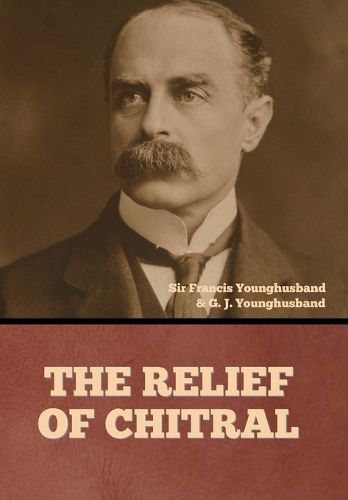Readings Newsletter
Become a Readings Member to make your shopping experience even easier.
Sign in or sign up for free!
You’re not far away from qualifying for FREE standard shipping within Australia
You’ve qualified for FREE standard shipping within Australia
The cart is loading…






This title is printed to order. This book may have been self-published. If so, we cannot guarantee the quality of the content. In the main most books will have gone through the editing process however some may not. We therefore suggest that you be aware of this before ordering this book. If in doubt check either the author or publisher’s details as we are unable to accept any returns unless they are faulty. Please contact us if you have any questions.
"Comprehensively suitable for military historian, academic researcher or simply for general interest. "
"An excellent account of a siege on the northwest frontier of the" great game". "
"The siege and successful relief of Chitral was a key episode in British Imperial history, coming as it did just a decade after Britain's humiliation in Khartoum, and three years before the their long-delayed response against the Mahdi at Omdurman."
About the author:
Sir Francis Edward Younghusband, (born May 31, 1863, Murree, India-died July 31, 1942, Lytchett Minster, Dorset, England), British army officer and explorer whose travels, mainly in northern India and Tibet, yielded major contributions to geographical research; he also forced the conclusion of the Anglo-Tibetan Treaty (September 6, 1904) that gained Britain long-sought trade concessions.
Younghusband entered the army in 1882 and in 1886-87 crossed Central Asia from Beijing to Yarkand (now in the Uygur Autonomous Region of Xinjiang, China). Continuing on to India by way of the long-unused Mustagh (Muztag) Pass of the Karakoram Range, he proved the range to be the water divide between India and Turkistan. On two later expeditions to Central Asia he explored the Pamirs (mountains).
After repeated British attempts to gain trading rights with Tibet, Lord Curzon, viceroy of India, authorized Younghusband to cross the Tibetan border accompanied by a military escort to negotiate trade and frontier issues (July 1903). When efforts to begin negotiations failed, the British under the command of Major General James Macdonald invaded the country and slaughtered some 600 Tibetans at Guru. Younghusband moved on to Jiangzi (Gyantze), where his second attempt to begin trade negotiations also failed. He then marched into Lhasa, the capital, with British troops and forced the conclusion of a trade treaty with the Dalai Lama, Tibet's ruler. This action brought him a knighthood in 1904. (britannica.com)
$9.00 standard shipping within Australia
FREE standard shipping within Australia for orders over $100.00
Express & International shipping calculated at checkout
This title is printed to order. This book may have been self-published. If so, we cannot guarantee the quality of the content. In the main most books will have gone through the editing process however some may not. We therefore suggest that you be aware of this before ordering this book. If in doubt check either the author or publisher’s details as we are unable to accept any returns unless they are faulty. Please contact us if you have any questions.
"Comprehensively suitable for military historian, academic researcher or simply for general interest. "
"An excellent account of a siege on the northwest frontier of the" great game". "
"The siege and successful relief of Chitral was a key episode in British Imperial history, coming as it did just a decade after Britain's humiliation in Khartoum, and three years before the their long-delayed response against the Mahdi at Omdurman."
About the author:
Sir Francis Edward Younghusband, (born May 31, 1863, Murree, India-died July 31, 1942, Lytchett Minster, Dorset, England), British army officer and explorer whose travels, mainly in northern India and Tibet, yielded major contributions to geographical research; he also forced the conclusion of the Anglo-Tibetan Treaty (September 6, 1904) that gained Britain long-sought trade concessions.
Younghusband entered the army in 1882 and in 1886-87 crossed Central Asia from Beijing to Yarkand (now in the Uygur Autonomous Region of Xinjiang, China). Continuing on to India by way of the long-unused Mustagh (Muztag) Pass of the Karakoram Range, he proved the range to be the water divide between India and Turkistan. On two later expeditions to Central Asia he explored the Pamirs (mountains).
After repeated British attempts to gain trading rights with Tibet, Lord Curzon, viceroy of India, authorized Younghusband to cross the Tibetan border accompanied by a military escort to negotiate trade and frontier issues (July 1903). When efforts to begin negotiations failed, the British under the command of Major General James Macdonald invaded the country and slaughtered some 600 Tibetans at Guru. Younghusband moved on to Jiangzi (Gyantze), where his second attempt to begin trade negotiations also failed. He then marched into Lhasa, the capital, with British troops and forced the conclusion of a trade treaty with the Dalai Lama, Tibet's ruler. This action brought him a knighthood in 1904. (britannica.com)